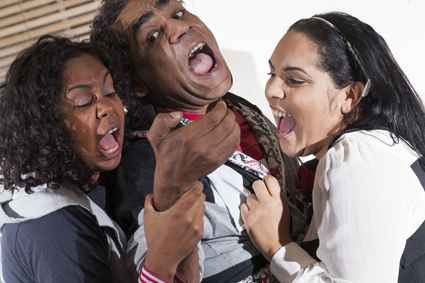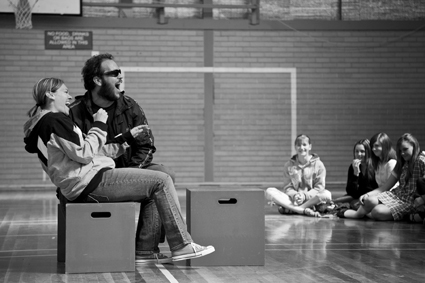the arc, the tension, the payoff
kamarra bell-wykes: experiencing dramaturgy

Maurial Spearim, Leroy Parsons, Uraine Mastrosavas, Body Armour, Ilbijerri
photo Steven Rhall
Maurial Spearim, Leroy Parsons, Uraine Mastrosavas, Body Armour, Ilbijerri
I DIDN’T TRULY UNDERSTAND THE MYSTERIOUS, OMINOUS ROLE OF THE DRAMATURG UNTIL I’D BEEN WRITING ‘PROFESSIONALLY’ FOR ABOUT FOUR YEARS AND HAD WORKED WITH FOUR OR FIVE DIFFERENT DRAMATURGS WHO HAD ALL BROUGHT ME DIFFERENT LESSONS ABOUT DRAMATIC CONVENTIONS.
With no formal training I was learning on the job, what worked and what didn’t. I seemed to have an infatuation with what didn’t, dragging my painfully over-worded, prose-filled, two-hander about a delusional heroin-addict Shrunken Iris around the country to various conferences and festivals like it was some sort of get-out-of-jail-free card or free-trip-to-wherever-the-next-conference-is card.

Nikki Ashby, Isaac Drandic, Chopped Liver
photo Steven Rhall
Nikki Ashby, Isaac Drandic, Chopped Liver
Most of my pieces (or should I say Shrunken Iris which was ‘debuted’ at least three times) though performed in theatres, were not really plays but more performance poetry. Then in 2006 I was given my first major commission, Chopped Liver—a comedy about Hep C, which was still not really considered a play but more a ‘health vehicle.’ So I put my on-the-job-lessons to work, did my research, set the scene, established a time frame, developed my ‘characters’ and not only thought I was all set but that I was quite clever to boot. I entered the rehearsal room armed with my first draft, that even when read by two talented actors sounded like a 45-minute walking-talking health pamphlet the effect of which could be equated to licking a piece of burnt toast. The awkward silence and uncomfortable looks on the surrounding faces (including the poor actors; was it them? could a script really be that bad?) made it clear that I was far from ‘entertaining the audience whilst educating them.’
Where was the journey, the humour, the tension, the arc, the payoff?
I turned to look at the knowing smirk of my esteemed dramaturg John Romeril, though I then had no idea who this old codger was and what he had achieved. I think I heard something about a baby factory [actually the famed Pram Factory of the 1970s. Eds] but he didn’t look that fertile to me. He had obviously read my script, had known it was wrong and let me enter the lion’s den without any intervention, and then met my silent plea of “Why didn’t you tell me?” with words to the effect of “oh well, back to the drawing board.”
At the time I couldn’t understand why he hadn’t said something to save me this humiliation, and I muttered to him, “I don’t think I can do this,” at which he laughed and reassured me, “Of course you can. It’s all there, it’s in the characters.” And so it was—in their backstories that I had written half-heartedly, not really understanding the point of the exercise. A map of their lives, the arc, the suspense, the tension, the journey and ultimately the real story of Hep C was all there waiting to be found and written. John, skilled dramaturg that he is, knew that he couldn’t show me, that I had to discover it for myself—then his job could really begin.
My most successful, enjoyable, educational, frustrating, painful, stick-a-fork-in-a-toaster dramaturgical relationship has been with John Romeril and not just because he is such a talented and experienced writer (though of course this helps), but because he recognised my internal creative source and helped me to find a way to tap it. He has helped me to harness my raw style and unpack the thoughts that well up from the ground, through my body and around my head and which I struggle to put on paper in a way that is interesting and watchable for the ever elusive ‘captive audience.’ On the flip side he also recognises when it is time to let my mind run free with the creative spirit, to purge the demons and indulge in the ‘genius,’ knowing once I have had my fun he will be waiting with coloured markers, yellow and blue note cards and his proverbial whip, ensuring I am developing believable, empathetic characters, that I am mapping a structure and plotting the journey, titling my scenes and even identifying a dreaded beginning, middle and end. All of which I would find quite tedious tasks without him acting as an encouraging and unsatisfiable sounding-board prodding me to writing glory by dryly asking, “Are you going to do some real work now?”
To me a good dramaturgical relationship has nothing to do with race or gender. I have worked with both men and women, Indigenous and non-Indigenous—maybe because I don’t write race- or gender-specific stories. I write stories that just happen to be about Aboriginal people. To achieve success it is essential for a dramaturg to be able to keep pushing past the point of what the writer thinks is possible, convincing them that it can be taken further, made better, that there is more truth to be found, revelations to be made, that there are more laugh-out loud and punch-em-in-the-guts moments, that not every word is precious nor every line needed, that the loudest moments are found in the silence, and though the ending may have been written the story is far from over. A non-Indigenous dramaturg must not be scared to ask questions that may seem ignorant, to make points that are not politically correct, to sometimes play the racist advocate but ultimately have an empathy and understanding of the diversity of the voices of Aboriginal people—recognising we are not all the same, that we all look, feel, think, desire, live, experience, express and write differently and yet somehow simultaneously share a commonality that belongs to all of us.
A good dramaturg also knows that some ground is sacred, that the truth cannot be changed nor doctored—and sacred ground is not monopolised by Indigenous people; truth is not a race-specific thing, we all have our own story we are trying to express, the place we are coming from or trying to get back to, the point we are trying to make. If dramaturgs try to force their interpretation of the truth then those are the stories they need to write themselves.
Kamarra Bell-Wykes is a descendant of the Jagera and Butchulla clan groups. Her plays include Shrunken Iris (Next Wave and Ilbijerri); Chopped Liver, which toured for four years visiting schools, prisons and Aboriginal communities from Broome to Cherbourg; Body Amour, (Ilbijerri 2012); and Mother’s Tongue (Yirra Yaakin, 2010). Kamarra recently participated in the Black Comedy creative development process for ABC2. She loves to explore modern day issues facing contemporary Aboriginal people.
RealTime issue #111 Oct-Nov 2012 pg. 10






